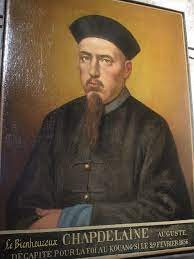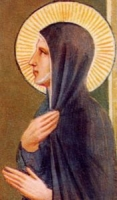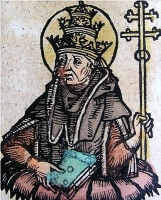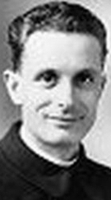Saint Auguste Chapdelaine
Also known as
• Augustus Chapdelaine
• Father Ma
• Papa Chapdelaine
Addtional Memorial
28 September as one of the Martyrs of China
Profile
Youngest of nine children born to Nicolas Chapdelaine and Madeleine Dodeman. Following grammar school, Auguste dropped out to work on the family farm. He early felt a call to the priesthood, but his family opposed it, needing his help on the farm. However, the sudden death of two of his brothers caused them to re-think forcing him to ignore his life’s vocation, and they finally approved. He entered the minor seminary at Mortain on 1 October 1834, studying with boys half his age. It led to his being nicknamed Papa Chapdelaine, which stuck with him the rest of his life.
Ordained on 10 June 1843 at age 29. Associate pastor from 1844 to 1851. He finally obtained permission from his bishop to enter the foreign missions, and was accepted by French Foreign Missions; he was two years past their age limit, but his zeal for the missions made them approve him anyway. He stayed long enough to say a final Mass, bury his sister, and say good-bye to his family, warning them that he would never see them again. Left Paris, France for the Chinese missions on 30 April 1852, landing in Singapore on 5 September 1852.
Due to being robbed on the road by bandits, Auguste lost everything he had, and had to fall back and regroup before making his way to his missionary assignment. He reached Kwang-si province in 1854, and was arrested in Su-Lik-Hien ten days later. He spent two to three weeks in prison, but was released, and ministered to the locals for two years, converting hundreds. Arrested on 26 February 1856 during a government crackdown, he was returned to Su-Lik-Hien and sentenced to death for his work. Tortured with and died with Saint Lawrence Pe-Man and Saint Agnes Tsau Kouy. One of the Martyrs of China
Born
6 January 1814 at La Rochelle-Normande, France
Died
beheaded on 29 February 1856 in Su-Lik-Hien, Kwang-Si province, China
Canonized
1 October 2000 by Pope John Paul II
Blessed Villana de'Botti
Profile
Daughter of Andrew de'Botti, a merchant. Villana was a pious child, and at age 13 ran away from home to join a convent. She was refused and had to return home. Soon after, her family married her to Rosso di Piero.
The rejection at the convent and the marriage seemed to change Villana. She suddenly became lazy and worldly, concerned only with pleasure. One day as she was getting dressed for some type of entertainment, her reflection in all her mirrors suddenly changed to a demon. Villana understood this to be a reflection of her sin-laden soul. She tore off her clothes, put on something poor and simple, and ran to the Dominican Fathers of Santa Maria Novella for help.
She became a Dominican tertiary, concentrated on her vocation of married life, and spent her free time praying and reading Scripture and the lives of the saints. Her desire to atone for her earlier life sometimes overwhelmed her, and her husband and family had to stop her begging door to door and doing other penances. She was given to religious ecstasies at Mass, but became the object of much ridicule and slander. Her health suffered, but she received visions of Our Lady and the saints, and had the gift of prophecy. Even her fiercest opponents eventually came to see her as a living saint.
Born
1332 in Florence, Italy
Died
• 29 January 1361 of natural causes
• body taken to Santa Maria Novella
• the Fathers were unable to bury her for a month due to the constant crowd of mourners
Prayers
O God, our merciful Father, you called Blessed Villana back from the emptiness of the world and aroused in her a spirit of humility and true penitence. Recreate in our hearts the power of your love and, filled by that same spirit, may we serve you in newness of life. We ask this through our Lord Jesus Christ, your Son, who lives and reigns with you and the Holy Spirit, one God, for ever and ever. - General Calendar of the Order of Preachers
Blessed Daniel Brottier
அருளாளர் டேனியல் ப்ரோட்டியர்
ரோமன் கத்தோலிக்க குரு:
பிறப்பு: செப்டம்பர் 7, 1876
லா-ஃபெர்ட்-செயின்டஸிர், ஃபிரான்ஸ்
இறப்பு: ஃபெப்ரவரி 28, 1936 (வயது 59)
பாரிஸ், ஃபிரான்ஸ்
ஏற்கும் சமயம்:
ரோமன் கத்தோலிக்க திருச்சபை
(தூய ஆவி சபை)
முக்திபேறு பட்டம்: நவம்பர் 25, 1984
திருத்தந்தை 2ம் ஜான் பால்
நினைவுத் திருநாள்: ஃபெப்ரவரி 28
அருளாளர் டேனியல் ப்ரோட்டியர், “தூய ஆவியானவரின் சபையைச்” (Congregation of the Holy Spirit) சேர்ந்த ஃபிரென்ச் ரோமன் கத்தோலிக்க குரு ஆவார். முதலாம் உலகப் போரின்போது (World War I), ஒரு கத்தோலிக்க குருவாக, இராணுவத்தினருக்கு இவர் ஆற்றிய சேவைகளுக்காக ஃபிரான்ஸ் நாட்டு இராணுவத்தின் மிகவும் உயர்ந்த பதக்கங்களான (Croix de guerre) மற்றும் (Légion d'honneur) ஆகிய பதக்கங்கள் இவருக்கு அளிக்கப்பட்டன.
இவர் மேற்கு ஆபிரிக்க (West Africa) நாடான "செனெகல்" (Senegal) நாட்டில் மறை போதகராக பணியாற்றினார். பாரிஸ் நகரின் புறநகர்ப் பகுதியான "ஒடேயுல்" (Auteuil) எனும் இடத்தில் உள்ள ஒரு அனாதைகள் இல்லத்தையும் நடத்தினார்.
"டேனியல் ஜூலஸ் அலெக்ஸிஸ் ப்ரோட்டியர்" (Daniel Jules Alexis Brottier) எனும் இயற்பெயர் கொண்ட இவர், கி.பி. 1876ம் ஆண்டு, "ஜீன்-பாப்டிஸ்ட் ப்ரோட்டியர்" (Jean-Baptiste Brottier) என்ற தந்தைக்கும் "ஹெர்மினி" (Herminie) என்ற தாயாருக்கும் பிறந்த இரண்டாவது மகனாவார். தமது பத்து வயதில் புது நன்மை (First Communion) பெற்ற இவர், அடுத்த வருடமே இளைஞர்களுக்கான குருத்துவ கல்லூரியில் சேர்ந்தார். தமது இருபது வயதில் "ப்லாயிஸ்" (Blois) நகரில் ஒரு வருட இராணுவ சேவை புரிந்தார். கி.பி. 1899ம் ஆண்டு, அக்டோபர் மாதம், 22ம் நாளன்று, குருத்துவ அருட்பொழிவு பெற்றார். அதன் பின்னர், ஃபிரான்ஸ் நாட்டின் "போன்ட்லேவோய்" (Pontlevoy) எனும் இடத்திலுள்ள பள்ளிக்கூடத்தில் மூன்று வருடங்கள் ஆசிரியராக பணியாற்ற அனுப்பப்பட்டார்.
ஆசிரியர் பணியில் முழுதும் அமைதியடையாத டேனியல், மறை போதக பணியாற்ற முடிவு செய்தார். பின்னர் அவர் கி.பி. 1902ம் ஆண்டு, “ஒர்லி” (Orly) எனுமிடத்திலுள்ள “தூய ஆவியாரின் சபையில்” (Congregation of the Holy Spirit) இணைந்தார். அங்கே துறவறப் புகுநிலையை பூர்த்தி செய்தார். 1903ம் ஆண்டு, அச்சபை அவரை மேற்கு ஆபிரிக்காவின் "செனெகல்" (Senegal) நாட்டில் மறை போதகராக பணியாற்ற அனுப்பியது. எட்டு வருடங்கள் அங்கே பணியாற்றிய அவர், தமது உடல்நிலையில் ஏற்பட்ட தொய்வின் காரணமாக 1911ம் ஆண்டு, ஃபிரான்ஸ் திரும்பினார்.
முதல் உலகப்போர் வெடித்ததும் அவர் ஃபிரான்ஸ் நாட்டின் இராணுவப் படைகளின் தன்னார்வ மறை போதகராக இணைந்தார். நான்கு வருடங்களுக்கும் மேலாக யுத்த பூமியில் இராணுவ வீரர்களிடையே மதப் பணியாற்றிய டேனியல் ஒருபோதும் தமது பணியில் சுணங்கியதேயில்லை. மாறாக, தமது உயிரைப் பணயம் வைத்து மறை போதக பணியாற்றினார். துணிச்சலுக்காக ஆறுமுறை மேற்கோள் காட்டப்பட்ட டேனியலுக்கு, ஃபிரான்ஸ் நாட்டு இராணுவத்தின் மிகவும் உயர்ந்த பதக்கங்களான (Croix de guerre) மற்றும் (Légion d'honneur) ஆகிய பதக்கங்கள் அளிக்கப்பட்டன. யுத்த பணிகளின்போது இவர் ஒரு சிறு காயம் கூட இன்றி தப்பினார் என்பதே பெரும் அதிசயமாக கருதப்படுகின்றது. போர்முனைகளில் தாம் தப்பிப் பிழைத்தற்கெல்லாம் காரணம், புனிதர் தெரசாவின் (St. Thérèse of Lisieux) பரிந்துரையே என்றார்.
புனிதர் தெரசாவின் (St. Thérèse of Lisieux) புனிதர் பட்டமளிப்பின்போது, பாரிஸ் நகரின் புறநகர்ப் பகுதியான “ஒடேய்ல்” (Auteuil) எனும் பகுதியில் அவருக்காக ஒரு சிற்றாலயம் கட்டினார். அதுவே அப்புனிதருக்கு அர்ப்பணிக்கப்பட்ட முதல் ஆலயமாகும்.
போருக்குப் பிறகு, “இராணுவத்தினரின் தேசிய ஒன்றிப்பு” (National Union of Servicemen) எனப்படும், பல்வேறு போர்களில் ஈடுபட்ட முன்னாள் ஃபிரெஞ்ச் இராணுவ தியாகிகளின் அமைப்பை நிறுவினார்.
முதல் உலகப்போரின் பின்னர், பாரிஸ் நகரின் கர்தினால் பேராயரான (Cardinal Archbishop of Paris) “லூயிஸ் எர்னெஸ்ட் டுபோய்ஸ்” (Louis-Ernest Dubois), 1923ம் ஆண்டு, நவம்பர் மாதம், பாரிஸ் நகரின் புறநகர்ப் பகுதியான “ஒடேய்ல்” (Auteuil) எனும் பகுதியில், அனாதைகள் மற்றும் கைவிடப்பட்ட குழந்தைகளுக்கான இல்லம் ஒன்றினை நடத்துமாறு “தூய ஆவியானவரின் சபையை” (Congregation of the Holy Spirit) கேட்டுக்கொண்டார். அருட்தந்தை டேனியலும், அவரது உதவி குருவான “ய்வெஸ் பிசொன்” (Yves Pichon) இருவரும், இல்லத்தின் வசதிகளை விரிவுபடுத்த 13 ஆண்டுகள் பணியாற்றினர். மற்றும், அனாதைகளின் நலனுக்காக வேலை செய்தார்கள். அவர் தனது பணியை இரு நோக்கங்களுக்கு அர்ப்பணித்தார்: ஒன்று, மிகவும் எளிய மற்றும் துரதிர்ஷ்டசாலிகளை பாதுகாப்பது; இரண்டாவதாக, புனிதர் தெரசாவின் (St. Thérèse of Lisieux) பரிந்துரைகளுக்காக அம்முயற்சிகள் மற்றும் உழைப்புகளை அர்ப்பணித்தல் ஆகியனவாகும்.
டேனியலின் உழைப்பின் பலனாக, அவ்வில்லத்தில், கட்டுமானப் பணிகளின் பட்டறைகள், திரையரங்கம், பத்திரிக்கைகள் மற்றும் அச்சகங்கள் உள்ளிட்டவை நிறுவப்பட்டு நடத்தப்பட்டன.
சுமார் 140 அனாதைகளுடன் பணியைத் தொடங்கிய அவர் பதின்மூன்று வருடங்கள் அங்கே பணியாற்றினார். 1936ம் ஆண்டு, ஃபெப்ரவரி மாதம், 28ம் நாளன்று, பாரிஸ் நகரிலுள்ள “தூய ஜோசஃப் மருத்துவமனையில்” (Hospital of St. Joseph) அவர் மரணமடையும்போது, 1400க்கும் மேற்பட்ட அனாதைகள் அங்கே பராமரிக்கப்பட்டனர்.
Profile
Ordained in 1899. Taught at the college of Pontlevoy, France. Entered the Congregation of the Holy Ghost at Orly, France in 1902. Missionary to Saint-Louis, Senegal in 1903. His health suffered, and he returned to France in 1911.
At the request of Bishop Jalabert, he conducted a fund-raising campaign to build a cathedral in Dakar, Senegal; he promoted the structure as a way to honour Africans who had died for France, and French who had died for Africa. The cathedral was consecrated on 2 February 1936, just a few weeks before his death.
Chaplain in the French army in World War I. Cited six times for bravery, awarded the Croix de Guerre and the Legion of Honour; he attributed his survival on the front lines to the intercession of Saint Therese of Lisieux, and built a chapel for her at Auteuil when she was canonized. After the war he administered the Orphan Apprentices of Auteuil. Honoured in his life and today as a man who put the family of God above considerations of nationality or race.
Born
7 September 1876 at La Ferté-Saint-Cyr, Diocese of Blois, France
Died
• 28 February 1936 of natural causes at Paris, France of natural causes
• 15,000 Parisiens turned out to honour him, and Cardinal Verdier preached his funeral homily
Beatified
25 November 1984 by Pope John Paul II in Rome, Italy
Blessed Stanislaw Antoni Trojanowski
Also known as
• Tymoteusz
• Timoteo Trojanowski
• Stanislaw Tymoteusz Trojanowski
• prisoner 25431
Additional Memorial
12 June as one of the 108 Martyrs of World War II
Profile
Born to a poor, rural family, he had limited schooling and had to work from an early age. Joined the Friars Minor Conventual in Niepokalanów, Poland on 5 March 1930, taking the name Tymoteusz and making his solemn profession on 11 February 1935. Worked in the convent infirmary, and the warehouse and shipping departments of the magazine Rycerz Niepokalanej (Knight of the Immaculate) with its founder Saint Maximilian Kolbe. At one point Brother Tymoteusz tried to go to the foreign missions, but gave it up when the Nazis invaded Poland to start World War II. Arrested with six of his brother friars in October 1941 by the Gestapo, and sentenced for forced labour at the Auschwitz death camp for the crime of being Catholic. Ministered to his fellow prisoners in his remaining few months. Martyr.
Born
29 July 1908 in Sadlowo, Mazowieckie, diocese of Plock, Poland
Died
28 February 1942 in the death camp hospital at Oswiecim (Auschwitz), Malopolskie, Nazi-occupied Poland of pneumonia
Beatified
13 June 1999 by Pope John Paul II
Pope Saint Hilary
புனிதர் ஹிலாரியஸ்
46ம் திருத்தந்தை:
பிறப்பு: ----
சார்டீனியா, மேற்கத்திய ரோமப் பேரரசு
Feast day 29 February (leap years)[citation needed]
28 February (common years)
இறப்பு : ஃபெப்ரவரி 29, 468
ரோம், மேற்கத்திய ரோமப் பேரரசு
கல்லறை: புனித லாரன்ஸ் பெருங்கோவில்
ஏற்கும் சமயம்:
ரோமன் கத்தோலிக்க திருச்சபை
கிழக்கு மரபுவழி திருச்சபை
கீழைக் கத்தோலிக்க திருச்சபைகள்
நினைவுத் திருவிழா: ஃபெப்ரவரி 28
திருத்தந்தை ஹிலாரியஸ் (Pope Hilarius) கத்தோலிக்க திருச்சபையின் 46ம் திருத்தந்தையாக கி.பி. 461ம் ஆண்டு, நவம்பர் மாதம், 19ம் நாளிலிருந்து, கி.பி. 468ம் ஆண்டு, ஃபெப்ரவரி மாதம், 28ம் நாள்வரை ஆட்சி செய்தார். அவர் ஒரு புனிதராக கத்தோலிக்க திருச்சபையால் வணங்கப்படுகின்றார்.
வரலாறு:
ஹிலாரியஸ், மேற்கத்திய மத்தியதரைக் கடலில் உள்ள “சார்டீனியா” (Sardinia) தீவில் பிறந்தார். அவர் பிறந்த ஆண்டு உறுதியாகத் தெரியவில்லை. திருத்தந்தை “முதலாம் லியோவின்” (Pope Leo I) ஆட்சிக் காலத்தில் ஹிலாரியஸ் அவருக்கு “தலைமைத் திருத்தொண்டராகப்” (Archdeacon) பணிபுரிந்தார். அவர் ரோம திருப்பீடத்தின் உரிமைகளை நிலைநாட்டுவதில் தீவிரமாக உழைத்தார்.
கி.பி. 449ம் ஆண்டில், கூட்டப்பட்ட “இரண்டாம் எஃபேசஸ் பொதுச்சங்கத்திற்காக” (Second Council of Ephesus) ஹிலாரியஸும், “புடேயோலி ஆயரான” (Bishop of Puteoli) “ஜூலியசும்” (Julius) திருத்தந்தை லியோவின் பிரதிநிதிகளாக செயல்பட்டனர். அப்பொதுச் சங்கம் “காண்ஸ்டாண்டிநோபிள்” (Archbishop of Constantinople) பேராயரான “ஃபிளேவியனைக்” (Flavian) கண்டித்ததை ஹிலாரியஸ் வன்மையாக எதிர்த்தார்.
திருத்தந்தை லியோவின் கடிதத் தொகுப்பில் ஹிலாரியஸ், “பைஸான்டைன் பேரரசி” (Empress of the Byzantine Empire) “தூய ஏலியா புல்ச்சேரியா” (St. Aelia Pulcheria) என்பவருக்கு எழுதிய கடிதமும் உள்ளது. அக்கடிதத்தில், அவர் திருத்தந்தையின் கடிதத்தைப் பொதுச்சங்கத்திற்குப் பிறகு பேரரசியிடம் ஒப்படைக்கத் தவறியதற்கு வருத்தம் தெரிவிக்கிறார். ஆனால், எபேசில் நடந்த முறைகேடான சங்கத்தில் நிகழ்ந்தவற்றைப் பற்றிய செய்தியை அவர் திருத்தந்தைக்குக் கொண்டு சேர்ப்பதற்கு முன் பல இன்னல்களைச் சந்திக்க வேண்டியதாயிற்று. அவர் ரோமுக்கோ “காண்ஸ்டாண்டிநோபிளுக்கோ” செல்வதை விரும்பாத “அலெக்சாந்திரியாவின் டயோஸ்குருஸ்” (Dioscurus of Alexandria) என்பவரின் கைகளிலிருந்து தப்பிச் சென்று, திருத்தந்தைக்கு செய்தி அளிக்க பெரும் பாடுபட்டார்.
ஆற்றிய பணிகள்:
ஹிலாரியஸுக்கு முன் திருத்தந்தையாகப் பணியாற்றிய முதலாம் லியோ, ரோம திருச்சபையின் அதிகாரத்தை உறுதியாக நிலைநாட்டி புகழ்பெற்றிருந்தார். ஹிலாரியஸ் திருத்தந்தை லியோவின் அடியொற்றி பணிபுரிந்தார் என்றாலும் லியோவைப் போன்று புகழ் பெறவில்லை. இருப்பினும் அவர் ஆற்றிய பணிகளுள் சில குறிப்பிடத் தக்கவை.
திருச்சபையில் நிகழ்ந்த நீசேயா பொதுச்சங்கம் (ஆண்டு: 325), எபேசு பொதுச்சங்கம் (ஆண்டு: கி.பி. 431), கால்செதோன் பொதுச்சங்கம் (ஆண்டு: கி.பி. 451) திருத்தந்தை லியோ கால்செதோன் பொதுச்சங்கத்திற்கு எழுதிய கடிதம் ஆகியவற்றில் அடங்கியிருந்த போதனைகளை வலியுறுத்தி ஹிலாரியஸ் கீழைத் திருச்சபைத் தலைவர்களுக்கு எழுதியதாகத் தெரிகிறது.
ஹிலாரியஸ் திருச்சபைப் போதனைகளுக்கு எதிராக ஆங்காங்கே எழுந்த திரிபுக் கொள்கைகளைக் கண்டித்தார். ரோம திருப்பீடத்தின் அதிகாரத்தை நிலைநாட்டினார்.
இத்தாலியில் ஹிலாரியஸ் "ஆரியுசுக் கொள்கை" (Arianism) என்று அழைக்கப்பட்ட ஒரு திரிபுரக் கொள்கை பரவாமல் இருக்க முயற்சி மேற்கொண்டார். ஆரியுசுக் கொள்கை, இயேசு கிறிஸ்து பற்றிய ஒரு தவறான கருத்தைப் பரப்பியது. அதாவது, "இயேசு கிறிஸ்து கடவுளின் மகன் அல்ல" என்றும், "கடவுளால் உருவாக்கப்பட்ட அனைத்துப் படைப்புகளுள்ளும் இயேசு ஒரு முதன்மையான படைப்பு மட்டுமே" என்றும் ஆரியசுக் கொள்கை கூறியது.
திருத்தந்தை ஹிலாரியஸ் ரோமின் புதிய பேரரசனாயிருந்த அந்தேமியுஸ் என்பவரை அணுகி, அவர் திரிபுக்கொள்கையினருக்கு ரோமில் இடம் கொடுத்தல் கூடாது என்று கேட்டுக்கொண்டார்.
மேலும் “ஸ்பெயின்” (Spein), “கால்” (Gaul) (இன்றைய ஃபிரான்ஸ் பகுதி) முதலிய பிரதேசங்களில் திருச்சபைச் செயல்பாடுகள் குறித்து வழிமுறைகள் நல்கினார். அங்கு நடந்த திருச்சபை ஆட்சிமுறையில் ஹிலாரியஸ் பல முறை தலையிட்டு தம் அதிகாரத்தை நிலைநாட்டினார்.
ஆயர்கள் நியமனம் பற்றி:
திருத்தந்தை ஹிலாரியஸ் கி.பி. 465ம் ஆண்டில் ரோம் நகரின் புனித மரியா பெருங்கோவிலில் (Basilica of Santa Maria Maggiore) ஒரு சங்கத்தைக் கூட்டினார். இறக்கும் தருவாயில் இருக்கும் ஓர் ஆயர் தமக்குப் பின் யார் ஆவார் என்று யாரையும் குறித்துக் கூறுதல் முறைகேடானது என்று அறிவித்தது.
கட்டடப் பணிகள்:
திருத்தந்தை ரோம் நகரில் பல கோவில் கட்டடங்களை எழுப்பியும், புதுப்பித்து அழகுபடுத்தியும் பணிகள் புரிந்தார். புனித யோவான் பெருங்கோவிலில் மூன்று சிறுகோவில்களைக் கட்ட அவர் ஏற்பாடு செய்தார். அவற்றுள் ஒன்றை அவர் நற்செய்தியாளரான புனித யோவானுக்கு அர்ப்பணித்தார். இது பற்றிய விளக்கம் வருமாறு:
திருத்தந்தை லியோவின் காலத்தில் எபேசு நகரில் முறைகேடாகக் கூட்டப்பட்ட பொதுச்சங்கத்தில் லியோவின் பதிலாளாகச் செயல்பட்ட ஹிலாரியஸ் தம் கருத்தை ஆதரிக்கவில்லை என்று கருதிய சிலர் அவரைப் பிடிக்க திட்டம் தீட்டினார்கள். இதை அறிந்த ஹிலாரியஸ் அவர்களின் கைகளிலிருந்து தப்பியோடி, எபேசு நகருக்கு வெளியே அமைந்திருந்த புனித நற்செய்தி யோவானின் கல்லறைப் பகுதியில் ஒளிந்துகொண்டு உயிர் தப்பினார். இவ்வாறு தாம் உயிர் பிழைத்ததற்கு புனித யோவானின் அருளே காரணம் என்றுணர்ந்த ஹிலாரியஸ் புனித யோவானுக்குத் தம் வணக்கத்தைத் தெரிவிக்கும் பொருட்டு மேற்கூறிய சிறுகோவிலைக் கட்டுவித்தார்.
கி.பி. 455ம் ஆண்டு நிகழ்ந்த வாண்டல் படையெடுப்பின் போது உரோமைக் கோவில்கள் பலவற்றிலிருந்து பொன்னும் பிற செல்வங்களும் கொள்ளையடிக்கப்பட்டிருந்தன. அக்கோவில்கள் மீண்டும் தலைதூக்கி எழும் வண்ணம் ஹிலாரியஸ் பல நன்கொடைகளை வழங்கினார்.
மேலும், திருத்தந்தை ஹிலாரியஸ் புனித லாரன்ஸ் பெருங்கோவிலை அடுத்து ஒரு துறவற இல்லத்தை நிறுவினார்.
இறப்பும் அடக்கமும்:
திருத்தந்தை ஹிலாரியஸ், கி.பி. 468ம் ஆண்டு, ஃபெப்ரவரி மாதம், 29ம் நாள் மரித்தார். அவர் அழகுபடுத்திய “புனித லாரன்ஸ் பேராலயத்தில்” (Basilica of St. Lawrence outside the Walls) அவரது உடல் அடக்கம் செய்யப்பட்டது.
Also known as
Hilarus, Hilarius
Profile
Deacon. Trusted aide to Pope Saint Leo the Great. Papal legate. Sent to “Robber Synod” at Ephesus in 449 to report on the Monophysitism heresies of Eutyches, which denied the humanity of Christ and claimed that He had only a divine nature, a teaching condemned in 451 by the Council of Chalcedon. Eutyches' followers attacked the legate party, and forced them to return to Rome. Arch-deacon c.455. Worked on an updated method of calculating the date of Easter. Chosen 46th pope in 461.
As pope, Hilary confirmed the work of several general councils, rebuilt and remodeled many churches, fought Nestorianism and Arianism, and held several Councils at Rome. Renowned for defending the rights of his bishops while exhorting them to curb their excesses and devote themselves more completely to God. Helped define the Church‘s role in the empire, and affirmed the position of the pope, and not the emperor, as leader in spiritual matters. He continued Leo I‘s vigorous policy, strengthening ecclesiastical government in Gaul and Spain. Erected churches, convents, libraries, and two public baths, and his synod of 465 is the earliest Roman synod whose records are extant.
Born
on Sardinia
Papal Ascension
19 November 461
Died
28 February 468 at Rome, Italy of natural causes
Blessed Carlo Gnocchi
Profile
Youngest of three boys born to Henry and Clementine Gnocchi; his father died when Carlo was 5 years old, and his two brothers died of tuberculosis before he was 13. Priest in the archdiocese of Milan, Italy, ordained in 1925. Teacher and spiritual director of children. Chaplain to alpine troops in World War II. Helped Jews and Allied POWs escape to Switzerland, and was imprisoned for writing against Fascism. Founder of the Fondazione Pro Juventute and worked in the post-War era to care for those orphaned or disabled in the conflict.
Born
25 October 1902 at San Colombano al Lambro, Italy
Died
• 28 February 1956 at Milan, Italy of cancer
• he was an organ donor, and his corneas returned sight to two blind young people
Beatified
• 25 October 2009 by Pope Benedict XVI
• beatification recognition celebrated in the Piazza del Duomo, in Milan, Italy
Saint Romanus of Condat
Profile
Born a Gallo-Roman; brother of Saint Lupicinus. Became a monk at Lyon, France at age 35. Hermit in Condat (modern Saint-Claude) in the Jura mountains with his brother and sister; would-be students were attracted to them. Founded abbeys of Condat and Leuconne, and the convent of La Beaume (later named St-Romain-de-la-Roche), among others. Spiritual teacher of Saint Eugendus of Condat. Ordained by Saint Hilary of Arles. Healed two lepers by embracing them.
Born
c.390 at Upper Bugey, France
Died
• c.465 of natural causes
• buried at the abbey of Beaume
Patronage
• against insanity or mental illness
• drowning victims
• mentally ill people
Saint Oswald of Worcester
புனித_ஆஸ்வால்ட் (-992)
Feast day 29 February (leap years)[citation needed]
28 February (common years)
19 May (POCSP)
பிப்ரவரி 28
இவர் (#StOswaldOfWorcester) இங்கிலாந்தைச் சேர்ந்தவர். இவர் தன்னுடைய கல்வியைப் பிரான்சிலிருந்த தன்னுடைய மாமாவும், ஆயருமான ஓடோவோடு தங்கிக் கற்றார்.
959 ஆம் ஆண்டு குருவாக அருள்பொழிவு செய்யப்பட்ட இவர், சில காலம் வின்செஸ்டர் என்ற இடத்தில் பணியாற்றினார். 962 ஆம் ஆண்டு வோர்செஸ்டர் நகரின் ஆயராகத் திருப்பொழிவு செய்யப்பட்ட இவர், 972 ஆம் ஆண்டு யோர்க் நகரின் பேராயராக உயர்த்தப்பட்டார்.
இவர் ஆயராகவும் பேராயராகவும் பணியாற்றிய காலகட்டங்களில் துறவற வாழ்வில் மறுமலர்ச்சியைக் கொண்டு வந்தார். மட்டுமல்லாமல் தனது மறைமாவட்டத்தில் இருந்த குருக்கள் இறையியலில் இன்னும் ஆழம் காண்பதற்கு முறையான பயிற்சிகளைக் கொடுத்தார்.
ராம்சே மற்றும் வின்செஸ்டர் ஆகிய இடங்களில் துறவு மடங்களை நிறுவிய இவர் இறையியல் தொடர்பான பல நூல்களையும் எழுதினார். இவர் ஆற்றிவந்த இந்த அரும்பெரும் பணிகளுக்குப் புனித டன்ஸ்டன் மற்றும் எத்தல்வோல்ட் ஆகியோர் உறுதுணையாக இருந்தார்கள்.
992 ஆம் ஆண்டு இவர் ஏழைகளின் காலடிகளைக் கழுவும்போது தன் இன்னுயிரைத் துறந்தார்.
Profile
Oswald’s parents came from Denmark to England before his birth. The boy was educated by his uncle, Saint Odo the Good. Priest in the diocese of Winchester, England. Benedictine monk at Fleury-sur-Loire, France. Bishop of Worcester, England in 962. Worked with Saint Dunstan and Saint Ethelwold to revive monastic and ecclesiastical discipline in England. Founded the abbey at Ramsey, and the monastery at Winchester. Archbishop of York in 972. Wrote theological treatises, and worked for the improved theological training of his clergy. Daily washed the feet of poor people.
Died
29 February 992 of natural causes
Representation
• church
• demon
• dove
• ship
• stone
Blessed Antonia of Florence
Profile
Married and a mother of one. Widowed twice. Franciscan tertiary. Poor Clare nun. Spiritual student of Saint John Capitran. Abbess at Aquila, Italy from 1433 to 1447. Founded a Observant-oriented house of Poor Clares in Aquila. Sick the last 15 years of her life.
Born
1400 at Florence, Italy
Died
29 February 1472 in her convent at Aquila, Italy of natural causes
Feast day 29 February (leap years)[citation needed]
28 February (common years)
Beatified
1847 by Pope Blessed Pius IX (cultus confirmed)
Blessed Bosone of Chiaravalle
Also known as
Boson
Profile
Born to the Italian nobility, he was one of the first brought to the monastic life by Saint Bernard of Clairvaux.
Born
early 12th century Italy
Died
• late 12th century of natural causes
• legends say that angels came and sang around his death bed
Saint Caerealis
Also known as
Cerulus, Celerius
Profile
Imperial Roman soldier. Married to Saint Sallustia. Convert to Christianity, instructed in the faith by Pope Saint Cornelius. Martyred in the persecutions of Decius.
Born
Egyptian
Died
251 in Rome, Italy
Saint Marana of Beroea
Profile
Pious woman who lived a life of extreme asceticism walled up in a small house just outside of Beroea, Syria.
Died
c.455 in Beroea, Syria of natural causes
Saint Ruellinus of Treguier
Also known as
Ruellin of Treguier
Profile
Bishop of Tréguier, Brittany, France.
Died
6th century of natural causes
Saint Caerealis of Alexandria
Also known as
Cerulus
Profile
Martyr.
Born
Egyptian
Died
in Alexandria, Egypt, date unknown
Saint Sillan of Bangor
Also known as
Sillian, Silvanus
Profile
Spiritual student of Saint Comgall of Bangor. Abbot of Bangor Abbey.
Died
c.610
Saint Gaius of Alexandria
Also known as
Caius
Profile
Martyr.
Born
Egyptian
Died
in Alexandria, Egypt, date unknown
Saint Serapion of Alexandria
Profile
Martyr.
Born
Egyptian
Died
martyred in Alexandria, Egypt, date unknown
Saint Cyra of Beroea
Profile
Pious woman who lived a life of extreme asceticism walled up in a small house just outside of Beroea, Syria.
Died
c.455
Saint Pupulus of Alexandria
Profile
Martyr.
Born
Egyptian
Died
in Alexandria, Egypt, date unknown
Saint Theophilus the Potter
Profile
Potter. Martyred in the persecutions of Decius.
Died
martyred c.250
Saint Llibio
Also known as
Libio
Profile
No information has survived.
Died
6th century
Patronage
Llanlibio, Wales
Saint Macarius the Potter
Profile
Potter. Martyred in the persecutions of Decius.
Died
martyred c.250
Saint Rufinus the Potter
Profile
Potter. Martyred in the persecutions of Decius.
Died
martyred c.250
Saint Justus the Potter
Profile
Potter. Martyred in the persecutions of Decius.
Died
martyred c.250
Saint Maidoc
Also known as
Madoc
Profile
Sixth-century bishop. Llanmadog, Wales is named in his honour.
Saint Abercius
Profile
Martyr.
Died
stabbed with a sword
Saint Ermine
Also known as
Ermina, Febaria
Profile
Sixth century nun. Honoured in Ireland.
Anonymous Martyrs of Alexandria
Profile
A number of clerics and layman who died as martyrs of charity for ministering to the sick during a plague that ravaged Alexandria, Egypt in 261.
Martyrs of Unzen
Profile
16 lay people martyred together in one of the periodic anti-Christian persecutions in imperial Japan.
• Alexius Sugi Shohachi
• Damianus Ichiyata
• Dionisius Saeki Zenka
• Gaspar Kizaemon
• Gaspar Nagai Sohan
• Ioannes Araki Kanshichi
• Ioannes Heisaku
• Ioannes Kisaki Kyuhachi
• Leo Nakajima Sokan
• Ludovicus Saeki Kizo
• Ludovicus Shinzaburo
• Maria Mine
• Paulus Nakajima
• Paulus Uchibori Sakuemon
• Thomas Kondo Hyoemon
• Thomas Uzumi Shingoro
Died
28 February 1627 in Unzen, Japan
Beatified
24 November 2008 by Pope Benedict XVI
Martyrs of Antwerp
Profile
14 Christians who were martyred together. We know nothing about them but the names Alexander, Anicetus, Cyriacus, Eulalia, Faustus, Genesius, Hirena, Macarius, Mauritius, Modestus, Placidus, Rochus, Symforian and Victorinus.
Died
• in Rome, Italy, date unknown
• relics transferred and enshrined in Antwerp, Belgium
Martyrs of Corinth
Profile
A group of Christians martyred together in Corinth, Greece. The only information we have about them are the names Basilia, Betha, Caius, Claudius, Diodorus, Donatus, Enuclus, Felix, Hermes, Januaria, Januarius, Maccaris, Maninlia, Mansuetus, Nicophorus, Papias, Quinquianus, Rufunia, Serapion, Servilia, Silvana, Stercola, Tella, Veneria, Victor and Victorinus.
Also celebrated but no entry yet
• Abba the Great of Selevkia-Ktesiphon
• Elisabeth of Pomerania









